The coal slurry spill on March 23 in Boone County was just the latest in a long list of “accidents” in our state. 5,400 gallons of slurry burst from a pipe at Alpha Natural Resources’ Admiral Processing Plant into Drawdy Creek, a tributary of the Coal River, which runs through the community of Peytona. Nearly three miles of the stream was turned pitch black. This prompted officials to shut down the public water intakes for St. Albans and Lincoln County.
Coal slurry is the liquid by-product of “washing” the coal after it is mined. It’s a toxic soup of hazardous chemicals, organic compounds, and heavy metals. Chronic exposure to metals found in slurry can damage virtually every part of the body. Many of these compounds are known to be carcinogenic, neurotoxic, genotoxic, and connected to kidney disease and failure. Health problems caused by the heavy metals include intestinal lesions, neuropathy, kidney and liver failure, cancer, high blood pressure, brittle bones, miscarriages, and birth defects, among others.
Specific studies of the effects of coal slurry compounds on human cell tissues has found evidence that coal slurry causes cancerous proliferation, cell death, and damage to kidney cells. Slurry contains more than 50 known organic compounds and over 20 heavy metals. The precise chemical composition of coal slurry is largely unknown and variable.
Alpha and the WV Department of Environmental Protection rushed to protect the people from these dangerous substances by putting bales of hay in the creek, 24 hours after the pipe leaked not once, but twice, spilling, at its peak, 30 gallons per hour over three hours. As long as the water turned clear again, people would be none the wiser, right? About the same time the bales of hay went into the
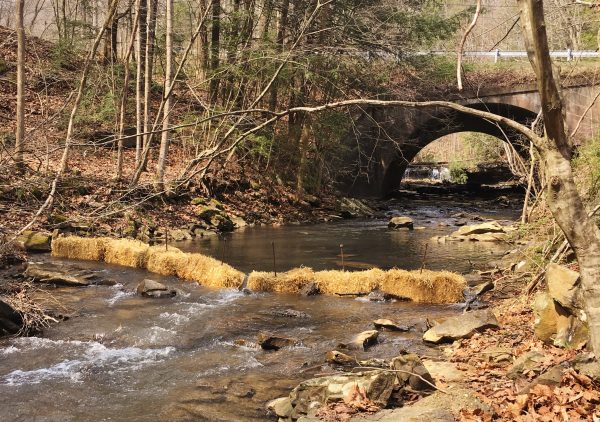
Bales of hay put across Drawdy Creek near Drawdy Falls Park in Boone Co. to stop the slurry spill. Photo by Erin Savage, Appalachian Voices
creek, the public water intakes reopened. One has to wonder, are those water treatment plants equipped to test for every single toxic element that is in coal slurry and have results less than a day after the spill?
It seems like anymore, West Virginians measure time in these disasters. Just take a look through our history and it’s obvious that we have had more than our share of incidents; the majority at the hands of the fossil fuel and chemical industries. However, it seems every time something happens, these companies claim it is just an “accident” or, more famously, “an act of God.” When we reported about the Peytona spill on social media, a lot of pro-industry folks made comments like “it was just an accident, you should leave it alone.” Just how many more “accidents” have to happen before we wise up?
The surprising thing is West Virginians seem to be getting increasingly numb to these so-called “accidents.” Seems like whenever something happens, we just shrug our shoulders and go about our business. Local media may talk about it for a day or two, then it just seems to disappear. Could be worse, right? Guess we should be glad what happened in Peytona was just a spill, and not a repeat of the slurry impoundment failure that caused the Buffalo Creek Disaster that killed 125 and left over
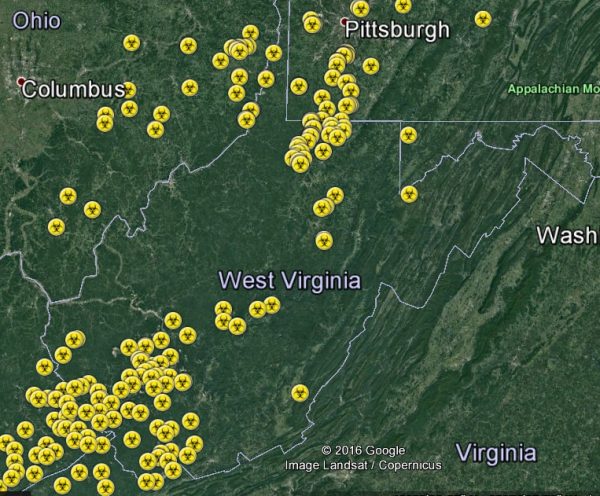
Google Earth image representing Coal Slurry Impoundments just in WV and surrounding areas alone. Each yellow circle is a slurry impoundment.
4,000 homeless. The creek just turned black in Peytona—maybe we should count our blessings?
It’s important to note that there is actually no need for slurry. There is a “dry filter-press” method that leaves the waste as solid materials. However, coal companies see this process as more expensive, so instead they just leave these massive toxic lakes in our communities.
There are more than 100 of these lakes, a.k.a. slurry impoundments, in West Virginia alone. Most are much bigger than the one at Buffalo Creek. It’s only a matter of time before the next one “leaks”, or worse. The Brushy Fork Impoundment in Raleigh County is taller than the Hoover Dam and holds 9+
billion gallons of toxic coal slurry. These impoundments are nothing more than unlined earthen dams that have the potential to fail at any time. I’m sure when that time comes, it will be considered just another “accident.”
It has only been three years since the MCHM chemical spill that left 300,000 people in central West Virginia without water. While it is true the MCHM leaked from a tank at Freedom Industries (a chemical storage facility), contrary to former Governor Tomblin’s exclamations that this had nothing to do with coal, this was a chemical only used by the coal industry to “wash” coal for market.
Last June, while on a tour of the former Freedom Industries site, not one, but two WV DEP officials commented that since there was such a small number of people on the tour, the issue must be “finally dying down.” I guess since they’ve torn down the tanks, it’s out of sight out of mind for the people.
Even during the MCHM crisis, people seemed to forget that just months before, in September, a chemical called DT-50-D turned an entire river white in Boone County when it burst from its container at a coal prep plant owned by the now non-existent Patriot Coal. Then there was another spill of over 100,000 gallons of coal slurry from a site also owned by Patriot into a tributary of the Kanawha River a month after the MCHM spill.
Nothing to see here folks, just move on. There have also been two more MCHM spills following the Elk River spill. One in Marmet, WV, just a month after the Freedom incident and one in February of this year at the Mammoth Coal Prep Plant that leaked into the Kanawha River. While it’s true these two were no where the size of the January 2014 spill, they still happened. More “accidents.” How many more have happened that we don’t know about?
I guess it was also just an accident that coal slurry got into the ground water sources for the towns of Rawl and Prenter, making people there sick. This was due to a technique concocted by Alpha’s predecessor, Massey Energy, to pump coal slurry into abandoned underground mine works. Hey, out of sight out of mind.
Now with up to 16 or more proposed pipelines in and around West Virginia, I suppose we should also forget the gas pipeline explosion at Sissonville that caused I-77 to shut down? That will never happen again, right? “Accidents” related to natural gas, pipelines, and fracking are not limited to just this incident either. Also, let’s not leave out that time the oil train exploded in Fayette County.
Then add in all the coal mine “accidents” like UBB, Sago, Aracoma, Farmington, Monongah, and so on. Those are just some of the major mine disasters in our history, not counting things like roof falls in mines, etc. The list of “accidents” goes on and on. That’s just in West Virginia. If you add in all the “accidents” in the Appalachian region (for example the Martin County, KY, slurry disaster or the time a boulder from a a mine site and killed a 3-year old while he slept in his bed in VA, or the Duke Energy coal ash spill) the number grows exponentially. I don’t know about you, but that sure does seem like a lot of “accidents” caused by industries.
Now that we have a coal baron as Governor – who appointed an ex-coal executive as head of WV DEP – should we expect more to happen? The DEP already fails in enforcement. Legislatures in D.C. and Charleston have worked years to dismantle regulations meant to prevent these things from happening. Now, with Trump’s attack on regulations and the WV Legislature’s attempts to weaken water quality standards, we are the ones at risk. Every attempt to dismantle the EPA leaves us vulnerable. It’s not a question of if, but when another “accident” will happen.
I guess as long as these companies keep waving the banner of jobs, we just let it happen. To them, these “accidents” are the cost of doing business. It seems to me that every time one of these companies gives us a black eye, we continue to praise them. They get rewarded for negligence. It’s a lot like battered spouse syndrome. They hurt us then promise never to do it again, but they do, and we do nothing. Should we really just forgive and forget? Or, should move away from an economy that revolves around companies that have so many “accidents”? Isn’t enough, enough?
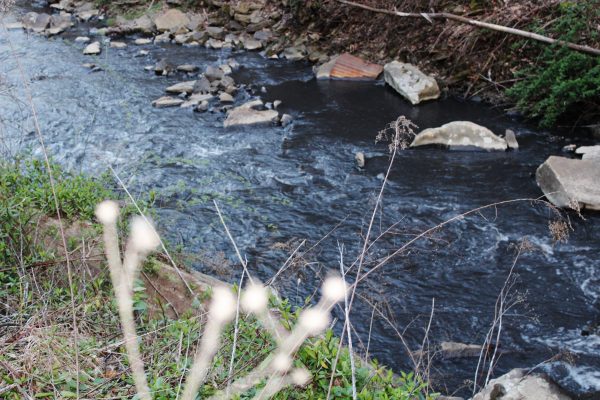
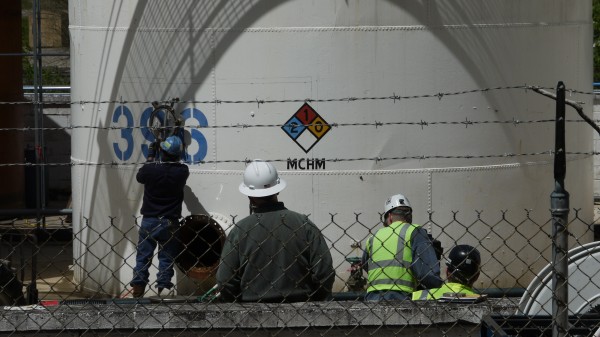
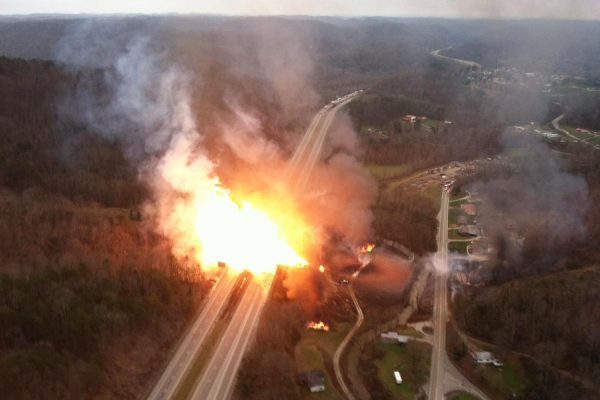
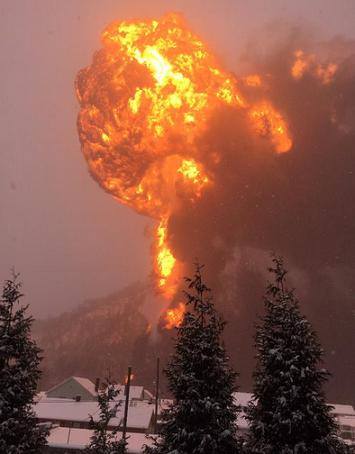
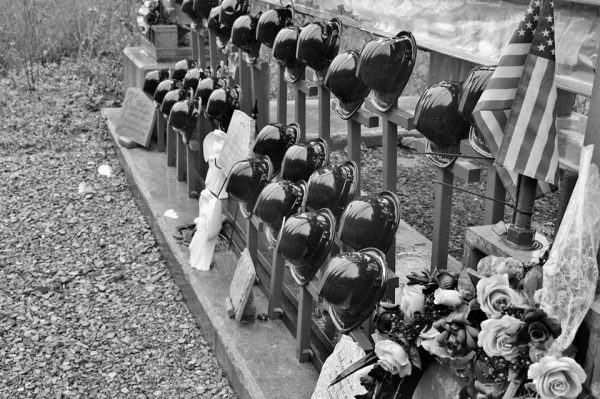




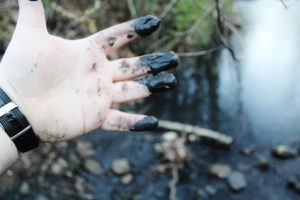





Unbelievable that this stuff continues to happen with little consequence to those responsible! Neglectful practice leads to so many health, environmental and economic problems. Maybe it is time to get some stricter laws regarding commercial negligence.